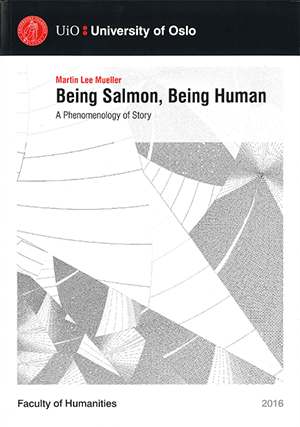Author
Martin Lee Mueller
About
Martin Lee Mueller's doctoral dissertation originated from a provocative article published in the Norwegian newspaper Dagens Næringsliv in 2010, where a fisheries professor asked: "What shall we do with wild salmon?" The article concluded that perhaps the time had come to sacrifice Norway’s wild salmon in favor of farmed salmon.
Mueller places this provocation into a wider philosophical context. The dissertation articulates a comprehensive critique of anthropocentrism (the idea that man is the measure and purpose for everything), through the perspective of the historical relationship between people and salmon. Two main themes go through this highly original piece of research: The first is the story of Western culture’s tragic alienation from nature. Surely, this has been illuminated before, but Mueller gives new life to the discussion by weaving together key narratives about the Norwegian salmon industry, the welfare of farmed salmon, wild salmon ecology, Gaia theory, as well as perceptions of wild salmon in indigenous cultures from the Pacific Northwest, perceptions that Mueller has become familiar with through personal interviews.
The second main theme is a detailed assessment of what we can call “salmon’s inner experiences”. Here Mueller develops a novel methodological grip on a familiar philosophical question, which the philosopher Thomas Nagel first formulated in the 1970s: "What is it like to be a bat?" Nagel concluded that this is something we simply cannot know. Mueller shares Nagel’s fascination for the question but not his conclusion. In his dissertation he develops a multidisciplinary strategy, which is primarily based on the body's phenomenology and on ecology, to pose the question about salmon’s inner experiences anew.
- Ever since antiquity, philosophers have observed the way in which philosophy springs from wonder. When we go carefully into today’s empirically founded knowledge about fish behavior and ecology, and when we simultaneously examine our own body’s sensual experience the world, we can actually get closer to a kind of 'salmon phenomenology' than Nagel would have supposed, says Mueller.
Here we encounter the shadow play of trees on the water’s surface, the moon’s passage in the night sky, the blue whale’s thousand-mile song, or the earth’s magnetism.
As the thesis unfolds, what emerges gradually is a multifaceted narrative of the complex, diverse, and contested human-salmon-relationship. Regarding the fisheries professor’s view on wild salmon, Mueller develops a clear counterposition:
- No form of life can be sacrificed. No form of life is superfluous. There isn’t any sharp distinction between "us" and "them." Whether we are human, eagle, salmon, tree, or microbe, we are all an essential part of the biosphere, says Mueller.
